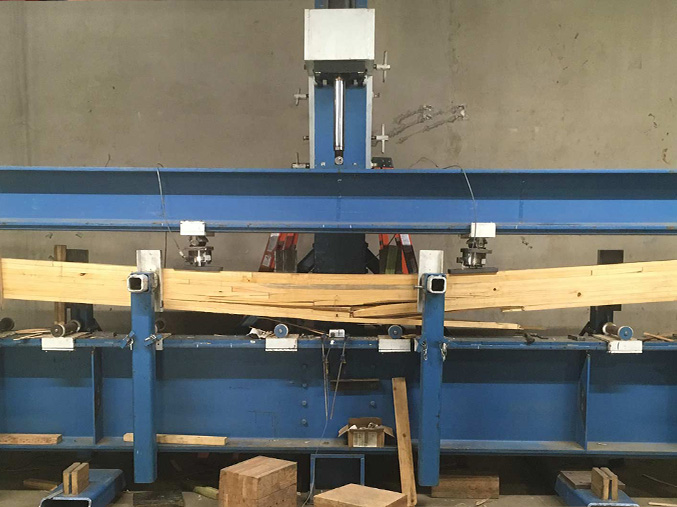ASTM D198 Modulus of Elasticity Measurement
The modulus of elasticity (also known as Young's modulus) is a crucial property in structural engineering, particularly for materials used in building and infrastructure. ASTM D198 specifies the procedure to determine this property using tension tests on small samples of wood or timber. This service ensures that engineers and construction professionals can confidently select, design, and use timber products with optimal performance.
Understanding the modulus of elasticity is essential for predicting how a material will behave under stress. For instance, in building applications, it helps determine the load-bearing capacity, deflection, and durability of wooden structures. This service supports compliance with international standards like ISO 14683:2015 and ASTM D198.
The test involves subjecting a standard specimen to gradually increasing tension until fracture. The relationship between stress (force per unit area) and strain (deformation) is then analyzed, yielding the modulus of elasticity value. This service ensures that timber products meet high-quality standards and are suitable for various applications in building and infrastructure.
The accuracy of this test impacts numerous aspects of construction projects, including material selection, structural design, and compliance with local regulations and codes like AS/NZS 4084:2015. By providing precise modulus of elasticity data, our service supports the integrity and longevity of timber structures.
Our laboratory uses state-of-the-art equipment to ensure reliable test results. Our technicians are trained in ASTM D198 procedures, ensuring consistent and accurate measurements. This service is particularly beneficial for quality managers, compliance officers, R&D engineers, and procurement professionals who require detailed insights into the mechanical properties of timber.
The modulus of elasticity plays a critical role in various aspects of construction, from designing load-bearing structures to assessing material fatigue under prolonged stress. By leveraging this data, engineers can optimize designs for strength and durability while minimizing material usage and costs. This service supports sustainable practices by ensuring that only high-quality timber is used in projects.
Our team works closely with clients to ensure that the testing process meets their specific needs and regulatory requirements. From specimen preparation to final analysis, we provide comprehensive support throughout the entire process. Our expertise in ASTM D198 ensures that every test result is accurate, reliable, and compliant with international standards.
The modulus of elasticity is a key factor in assessing the performance of timber under stress. By measuring this property accurately, our service helps ensure that construction projects are safe, efficient, and environmentally responsible. We pride ourselves on delivering precise results that contribute to the success of building and infrastructure projects around the world.
Applied Standards
| Standard Number | Title | Description |
|---|---|---|
| ASTM D198-14 | Standard Test Method for Tension Testing Small-Dimensioned Wood Specimens in Two Perpendicular Planes | This standard specifies the procedure for tension testing small wood specimens to determine their modulus of elasticity. It ensures consistent and accurate measurements across different laboratories. |
Benefits
- Ensures compliance with international standards like ASTM D198-14 and ISO 14683:2015.
- Provides accurate and reliable modulus of elasticity data for timber specimens.
- Supports the design and optimization of structural components in building and infrastructure projects.
- Aids in selecting high-quality timber products that meet strict performance criteria.
- Facilitates compliance with local regulations and codes, ensuring safety and sustainability.
- Reduces material waste by optimizing the use of timber based on its mechanical properties.
Environmental and Sustainability Contributions
- Supports sustainable forestry practices by ensuring that only high-quality, durable timber is used in projects.
- Promotes the efficient use of resources through accurate modulus of elasticity testing, which informs optimal material selection.
- Aids in reducing waste and improving resource efficiency in construction processes.





